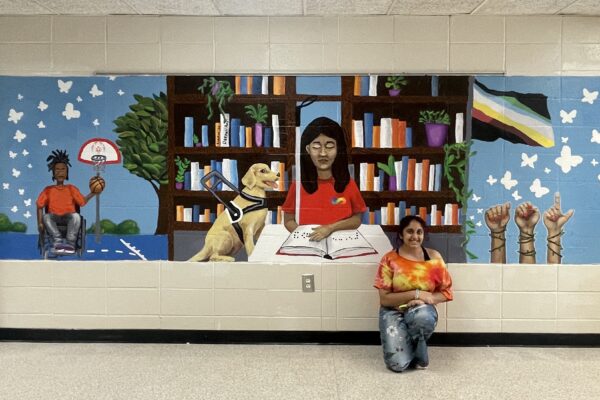At a Gwinnett County high school, a once-boring beige brick hallway wall now bursts with color. A painted mural features hands spelling out ASL in American Sign Language, a young girl reading braille, and the bright stripes of the disability pride flag.
The mural is more than decoration. For its creator, 17-year-old Deepali Patel, it represents a vision of inclusivity shaped by lessons from the ACLU National Advocacy Institute in Washington, D.C.
The advocacy boot camp brings students face-to-face with lawyers and activists who protect civil rights. Deepali found one workshop on the history of disability rights especially impactful.
“I didn’t realize how much disability history we don’t learn in school,” she said. “Hearing about the Americans with Disabilities Act, the protests that led to it, and people’s creativity in finding ways to adapt, it opened my eyes.”
A Personal Connection
Deepali’s interest in disability rights started at home. Watching her older sibling navigate the special education system made the issue deeply personal from an early age.
“I’ve always been close to my sister. I learned a lot from her experience of going through school. How students in special education feel isolated or like they don’t belong. That’s what first drew me in,” she said.
At the institute, Deepali learned about milestones in disability advocacy. She heard about the 504 Sit-in of 1977 when activists occupied federal buildings to demand enforcement of disability protections. She learned how decades of activism led to the 1990 passage of the American with Disabilities Act. She also heard stories from people who challenged stereotypes and built tools to improve access.
The workshop changed how Deepali understood advocacy. She realized the work does not have to look one way.
“You can be an artist, an engineer, a student, and still be a part of a movement. I thought leadership meant like, being in charge. The (workshop) showed me it can mean listening, helping others, making space for people who get ignored,” she said.
To attend the institute and participate in its workshops, Deepali submitted essays, a letter of recommendation, and more. The selection process was competitive, with reviewers considering how she described her experiences and connected them to the organization’s mission.
“We look for curiosity, empathy, and a desire to grow as a thoughtful advocate,” said Andrew Domingue, senior director, Board Governance & ACLU Advocacy Institute. “We want students to see themselves as part of important movements. Our goal is to inform but also to listen and empower.”
‘Everyone Wanted to Help’
Deepali returned home to Georgia after attending the institute determined to do something meaningful and lasting.
“I’m not really a legal person, but I think art can help unify people,” she said. “Through art, I kind of found a way that I could be an advocate, and I could help with an issue I’ve been concerned about for a while.”
She decided to design a mural to honor people living with disabilities and to help educate her school. Before creating a sketch, Deepali interviewed teachers and surveyed classmates about their understanding of disability rights. Then, she researched symbols like the autism infinity loop and the disability pride flag.
She created the mural digitally, projected it onto the wall, and traced its outline by hand before recruiting more than a dozen students and teachers to help fill it in.
“I made it like a giant coloring sheet,” she said. “Everyone wanted to help. It took about three days. By the end, it didn’t feel like just my project anymore.”
Building on her mural project, she is now sharing it online. She posts tutorials on designing similar murals, securing approval, budgeting supplies, and organizing volunteers. She said she learned from a digital advocacy workshop at the institute how to make connections and encourage others to have an impact.
“If we learn about each other, we start to care more. That’s how change happens.”

